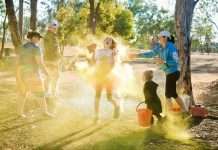
“I feel like he should be talking more by now.” In a world in which we are inundated with information about what our children “should be” doing and “have to” to do, it’s very easy for us as parents of young children to second guess ourselves and our understanding of how our little ones are developing.
I had a chance to sit down and speak with Dana Albrecht, M.S., CCC-SLP, the Director of Clinical Education at the Kay Armstead Center for Communicative Disorders at San Jose State University. Dana is a speech-language pathologist and works with clients and families affected by disorders affecting speech and language.
Dana has some advice for families with young children who have questions or concerns about speech and language development.
What are some of the main points you’d like to impart to parents about what to “look out” for as far as red flags for communication development?
I would say that parents should trust their instincts; that’s number one. If you have a concern, there is no harm in finding somebody to look at it from another set of eyes—somebody who knows child development and knows what to look for. So, not to hesitate to look for a resource. In the end, they might just say, “They’re fine,” and you can go on your way and feel better about it.
The other thing I would say is that every child is very different, and there is a broad range of when a child might develop a particular skill. So, just because a chart says that your child should be saying their first word by 12 months doesn’t mean they have to. If they’re just going right along with all their other milestones—their motor development, their cognitive development, and their feeding seems just fine— maybe they’re just not a big talker, so don’t get too concerned. Again, though, if you have any hesitations or any questions you’d like answered, by all means, go ask somebody.
Can you give us a few basic milestones to be aware of when it comes to early speech and language development?
In general, we like to see our first words by about a year. We like to start seeing them putting words together and making short phrases and sentences by about 2 years (again, these are just kind of gross numbers; every child is different, so make sure that you keep that in mind).
The other thing that parents may or may not realize is that when their children are really working hard in one skill set area like motor development, they might even regress a tiny bit in something like their language development or their speech development. There’s this constant give and take—their brain is focusing on one area or another. I like to let parents know they need not always be too alarmed if you see short little silent periods. But again, if you feel like, “Gosh, this doesn’t seem normal,” then find out!
The sections of our brain work together. If your child’s motor area is really active in his or her brain, you might see a huge spike in language development just following new motor skills. This is because that activity really helps to get all those neural connections in the brain to start working. Right after they start crawling, you might see a huge difference in their babbling, or right after they start walking, you see them take off in their speech and language skills. It’s exciting to watch how all the different areas of development play into each other.
What are some of the different local resources you’d recommend to parents?
If they’re under the age of three and you’re concerned, asking your pediatrician would be very appropriate, and he or she may have great resources. If the pediatrician is also concerned, they will likely refer you to your local regional center, who will then do an evaluation and move forward.
If your child is three or older, then your school district is your primary resource. If you have a concern, all you have to do is walk into your school district office and say, “I have concerns about my child’s speech and language.” It may be that your pediatrician also has concerns, and then they will do an evaluation through the school district for anybody three and older.
You can always ask a private clinic as well, or a place like a university clinic, like Kay Armstead Center for Communicative Disorders. We take anybody from birth to the last day of your life (we serve the whole lifespan). We see kids who have parents that are just not quite sure if they’re developing along the right trajectory, and we also see kids who already have a diagnosed disorder or delay. We’re happy to help you see where your child falls along the developmental continuum if you have concerns.
Do you have any favorite online resources that you think could be useful for parents?
My go-to is always the ASHA website, just because it has great parent resources that I trust. If you were to do a Google search, I’d recommend any resources that teach communication through play. That’s what’s optimal for this younger age set, and there are all sorts of resources out there about how to encourage your child to talk more through play. If you’re playing, you’re doing the right thing!
Editor’s note: This article originally published on October 23, 2017, and was lightly edited prior to republishing.















